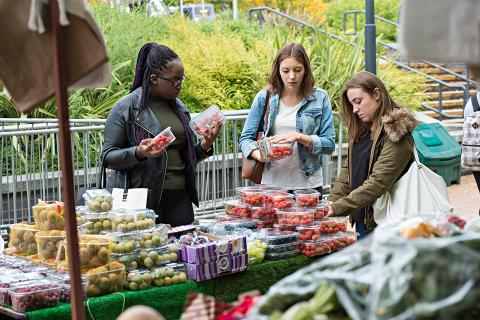Culture shock
If you're a new international student, you may experience difficulties adapting to the shock of a new environment, meeting lots of new people and learning the ways of a different country. You may also be separated from the important people in your life, maybe family, friends, colleagues, teachers. When familiar sights, sounds, smells or tastes are no longer there you can miss them very much. If you are tired and jet-lagged when you arrive small things can be even more upsetting, so we want to provide you with guidance on how to adapt to your new lifestyle at Keele.
Things that can affect culture shock
- Climate - especially with the UK winter months which can be very cold!
- Food - some British foods can be bland or heavy compared to international cuisines.
- Language - even if you are fluent in English, you may come across words local to Stoke which you do not understand.
- Dress - wearing heavy winter clothes which you may not be used to.
- Social Roles - you may find the relationships between men and women more formal or less formal than you are used to, as well as differences in same sex social contact and relationships.
- 'Rules' of behaviour - The British generally have a reputation for punctuality. You should always be on time for lectures, classes, and meetings.
- Values - different views of the world. When you understand both cultures, you will probably find some aspects of each that you like and others that you don’t.
How to help ease culture shock
- Keep in contact with people back home using your usual social media platforms. However, don't spend too much time on these as this could prevent you from integrating into the new culture.
- Keep photos in your room of family and friends.
- Find a supplier of familiar food.
- Stay healthy - with a balanced diet and exercise. Keele is a beautiful campus to walk around and explore!
- Make friends with both home and international students - home students will help you understand the new culture, while international students can empathise with you.
- Get involved in societies and sports.
- Take part in Keele Welcome activities - you will find further information on the Keele App.
- For some students linking with a faith community will put you in touch with a familiar setting.
- Talk to someone if you are struggling, don't isolate yourself!
UKCISA has further guidance on facing culture shock.
You will notice differences between the way things are done in the UK and what you are used to at home. This includes the way people dress, speak and behave, teaching and learning styles, food -and potentially all aspects of life.
In the UK there are many unspoken rules that affect the way people treat each other.
Greeting someone

British people are quite reserved when greeting one another. A greeting can be a bright “Hello”, “Hi” or “Good Morning/afternoon”.
The most formal way to greeting in the UK is a handshake. This is used when meeting someone for the first time and in formal occasions, eg at an interview or business meeting. Usually, you will shake the other person’s right hand with your right hand. Hugging and kissing on the cheek is usually reserved for greeting close friends or relatives.
You may also be called by many different ‘affectionate’ names according to which part of the UK you are visiting. Please do not be offended this is quite normal. For example you may be called: Dear, Love, Mate, Bro, Hun. In some parts of the country some people may use more unusual names such as: Duck, Flower, Sugar, Sweetheart.
 Manners
Manners
‘Please’ and ‘thank you’ are probably some of the most common phrases in the UK and it is important to use them when appropriate. British people are also famous for over-apologising! You will probably hear people say sorry for a number of minor incidents such as bumping into you or asking you a question.
Punctuality
The British have a reputation for being punctual. Time keeping is very important in the UK, therefore you should always be on time for lectures, classes and meetings. If you are going to be late you must contact whoever you are meeting to advise them, you will be late.
Queuing
Supermarkets, train stations, banks – you’ll see queues everywhere you go in the UK! British people are very disciplined when in comes to waiting in line and anyone who tries to jump the queue will probably receive some negative comments or looks.
UK Licences
Apply for a National Insurance Number (NI Number)
If you want to work in the UK then you will be required to have a National Insurance number. To apply for a national insurance number please visit this website, it may take a few weeks for this to get processed, however you are unable to work without one.
TV Licence
In the UK, you need to be covered by a TV licence to watch or record live TV programmes on any channel, and download or watch BBC programmes on iplayer. This could be on any device, including a TV, desktop computer, laptop, mobile phone, tablet etc. If you do not have a TV licence you are at risk of being fined. For further information and details please click here.
Driving
If you would like to drive during your time in the UK you must have a valid driving licence. It is an illegal offence to drive without one. Whether you have this or not depends upon the country of issue. To find out if you can drive in the UK, and for how long, you can use the interactive tool. Should you need to exchange your driving licence you can find out how to do so here.
UK legal requirements may also be different from your home country further details can be found here. In the UK the Highway Code documents legal requirements when driving, and if you disobey these rules you are committing a criminal offence. It is advisable to familiarise yourself with the code as driving rules may be very different to the country where your license was issued. For example:
- All passengers in a car must wear a seatbelt when travelling in the front of a car, and in the rear of a car where one is provided.
- There are strict laws about drinking alcohol and taking drugs whilst driving.
- The use of a handheld mobile phone whilst the engine is running is prohibited.
Academic Support Skills
We understand that studying at University in the UK is different from your home country. It requires a transition to a more independent approach to learning. This includes different methods of being taught and understanding the requirements of writing an assignment. This can all be challenging, however support is available for you to meet these academic expectations.
Before you complete any work at the University, it is important that you are familiar with Student Academic Conduct, as this will provide you with lots of information on what to do and what not to do when preparing for your assignments and assessments.

